#detailed writing tips
Text
Writing Tips For You (as if I don’t currently have insane writer’s block)
-Can’t start a scene? Write the setting instead. What is the lighting like? Is this place comfortable? Is it familiar or not? What should you point out now so it doesn’t suddenly appear when it becomes important for the characters? SET! YOUR! STAGE!
-Everyone says “show, don’t tell”. I like to think of that as “what are your character’s physical reactions? What are they feeling?” You can say “Character looked dismayed”, or you can say “Character grimaced with dismay.” See the difference?
-Struggling with dialogue? Talk to yourself while you’re writing. You might be blocking yourself if you subconsciously think some dialogue feels unnatural.
-Context, context, context! This applies to everything from the small interactions to the big plots. Every force has an equal and opposite reaction, allow interactions and events to grow as such.
-Context, context, context pt 2! But worldbuilding! If your character is performing an act, how does that fit into the physical reality they already exist in? How is it possible? Can you imply (imply, not explain) that these things are commonplace or why they wouldn’t be?
-Build the action. (Stealing this from theater class like twelve years ago.) You can’t just put a character into the scene and say ‘they made a sandwhich’. What has to happen for the sandwhich to be made? Your character has to walk into the kitchen, open the cupboard, get out a plate, get out the jam and peanut butter, get out a plate, get out the knives, open the fridge, get out the bread, close the fridge, open the bread bag, lay down two slices of bread on the plate, close the bag, open the first jar, pick up the first knife, scoop up the jam, slather it on the bread, put the knife down, close the first jar- and so on and so forth. Every small step is necessary for you to understand, and to engage your readers. You don’t have to go into ridiculous detail like I just did, but even understanding that for yourself.
-See above, but it’s not a scene and a sandwhich. The scene is your whole story and the sandwhich is your plot. What small steps MUST happen to reach the climax? Does changing one of those small steps change the result? How?
-Emotions are best portrayed when you have experienced them or can get insight from those who have experienced them. Let yourself get emotional in a scene. Allow yourself to be empathetic and vicariously experience what your characters are.
-Reread your own work! Your writing style and characterizations can change over time, but if you feel like you’re losing them, don’t be afraid to look at where you started to ground yourself!
-Proofread your own work 2-12 hours after you finish a section! Not while you’re writing! Don’t let yourself get carried away with writing things ‘right’, just get the ideas out.
-Have a friend or volunteer proofread for you too! This can help pick out things you repeatedly say, words you might misuse, grammar and punctuation that might need correction, and phrases that are hard to digest or don’t make sense.
-Make sure you’re making an effort to use regionally/era specific words and slang both in dialogue and in your writing. There are plenty of websites and videos online that list and discuss regional and era slang worldwide. Not to mention, we can connect with people all over the world using the web just to ask! Using incorrect phrases can really break immersion and make characters feel- well, out of character! I.E. an 80s jock saying ‘dope bruh’, American characters (generally) saying ‘lift’ instead of ‘elevator’, so on and so forth.
-Research research research! Research bloodloss limits, research how laws and jobs operate in different regions and countries, research weirdly specific myths and biblical themes, research as much as you can! You can only build a richer environment to write in!
-If you actively want to implement themes, allow them to reflect the experiences of your character. Example character is an Italian American who was orphaned at 13 after his orthodox Catholic parents died, he has been in and out of foster care his whole life, and the moment he got out his military job became strict and he allowed himself to be blackmailed to protect a child in a similar position. This has plenty of fun themes and symbolisms, like sacrifice, fate, lack of control, love, losing autonomy, etc, all of which can be framed under the impactful history of his Catholic childhood. This evokes the imagery of farm animals, servitude, animal tags/dog tags, holy spaces being used for other purposes. Play with it!
-Build three base playlists! One for your overarching story, one for songs that remind you of the main character and their story arc, and one for how you feel when you’re writing/songs that weirdly remind you of your story. You can cycle through these to help get into your mood.
-Consume other media! If all you do is focus on writing, you WILL lose steam and inspiration. Don’t be afraid to watch new shows, read new books, look at more artwork, read more poems, listen to more music. You might get a flicker of inspiration for themes, motives and ideas, and you’ll continue to fill yourself instead of dumping your focus out on your writing.
-Understand how each major character thinks and instinctively reacts to things. Some characters can stay calm, but others might instinctively react to things ‘angrily’, others might try to run away. This is an easy way to figure out character flaws and impliment easy conflicts.
And last but not least:
-Take breaks! Don’t worry about forcing yourself to keep a posting schedule (unless you’re being paid. I’m not. I’m doing this shit for free and for funsies) if all you do is spend all your time worrying about your writing, you won’t be able to relax your brain. Spend time with friends, play games, go outside!
I hope this helps!
#text#writing#writing tips#tips#pro tip#fanfic#fanfiction#fanfics#fanfictions#fanfic writing#writers block#fun#art#help#writing help#answer#questions#list#detailed writing tips#writing tips with auntie vivi#writing prompt#writing wip#prompt#characterization#writing characters#world building#book#books#story
107 notes
·
View notes
Text
As a french person, it's kinda funny to me when fanfic writers make Alastor speak french, and it's always things like "Bonjour mon cher, je t'aime" you know, typical french words from the main France french most people learn here and there.
The thing is, Alastor knows french creole from Louisiana, which isn't the usual France french most people know. Alastor would speak like "Bonjou konmen to yê?" Or "Mo laimm twa" instead ahah.
Also, there's different versions of french creole, the one from Louisiana is not exactly the same from Antillean Creole or French Guianese Creole. If you want here's an example to what Louisiana Creole sounds like!
So yeah if you want to spice up your fics and be more accurate with your Alastor speaking french creole, dont be afraid to look out for Louisiana Creole expressions instead of the typical french you'd normally use! Makes it more fun and more accurate 💃
#hazbin hotel#hazbin hotel fandom#hazbin alastor#text#Creole is still mostly understandable for France french like me but I could not speak creole myself ahah idk if that makes sense to you#also this is not throwing shade at people who write alastor speaking french at all yall this is still a nice detail to add anyways#just some friendly tip if you want to make him speak more accurately
1K notes
·
View notes
Text
Some small details for a character learning sword fighting for the first time:
- sore wrists
- blisters on hands
- every movement opens you up to be hit
- they will hit the tops of their arm and own sides with the sword while learning
- there is a primal sixth sense when you know you’re being toyed with
And, for your typically nonviolent characters.
You don’t aim for the swords. You aim for the person holding the sword.
It sounds so obvious but needs to be accepted. Actively. When holding a sword you have to understand you’re attacking another person. Even to block you have to aim your blocks at the other person or they won’t be strong enough to actually protect yourself.
#writing tips#sword fighting#idk if these are TIPS but they’re details you can feel free to use!!#also I started German Longsword fighting!#it’s fun!#they gave me a sword immediately when I walked in#asked for my name about 30 minutes later lol
1K notes
·
View notes
Text
Low level/continuous pain tips for writing
Want to avoid the action movie effect and make your character's injuries have realistic lasting impacts? Have a sick character you're using as hurt/comfort fodder? Everyone has tips for how to write Dramatic Intense Agony, but the smaller human details of lasting or low-level discomfort are rarely written in. Here are a few pain mannerisms I like to use as reference:
General
Continuously gritted teeth (may cause headaches or additional jaw pain over time)
Irritability, increased sensitivity to lights, sounds, etc
Repetitive movements (fidgeting, unable to sit still, slight rocking or other habitual movement to self-soothe)
Soft groaning or whimpering, when pain increases or when others aren't around
Heavier breathing, panting, may be deeper or shallower than normal
Moving less quickly, resistant to unnecessary movement
Itching in the case of healing wounds
Subconsciously hunching around the pain (eg. slumped shoulders or bad posture for gut pain)
Using a hand to steady themself when walking past walls, counters, etc (also applies to illness)
Narration-wise: may not notice the pain was there until it's gone because they got so used to it, or may not realize how bad it was until it gets better
May stop mentioning it outright to other people unless they specifically ask or the pain increases
Limb pain
Subtly leaning on surfaces whenever possible to take weight off foot/leg pain
Rubbing sore spots while thinking or resting
Wincing and switching to using other limb frequently (new/forgettable pain) or developed habit of using non dominant limb for tasks (constant/long term pain)
Propping leg up when sitting to reduce inflammation
Holding arm closer to body/moving it less
Moving differently to avoid bending joints (eg. bending at the waist instead of the knees to pick something up)
Nausea/fever/non-pain discomfort
Many of the same things as above (groaning, leaning, differences in movement)
May avoid sudden movements or turning head for nausea
Urge to press up against cold surfaces for fever
Glazed eyes, fixed stare, may take longer to process words or get their attention
Shivering, shaking, loss of fine motor control
If you have any more details that you personally use to bring characters to life in these situations, I'd love to hear them! I'm always looking for ways to make my guys suffer more write people with more realism :)
#voidrambles#writing#whump#does this count as that? whatever those folks will probably enjoy it at any rate#this is honestly mostly for my own reference but i hope it can maybe help some other people too :)#I'm so pulled in by books that write pain in a human and detailed way and not just when it's dramatic or intense#would love to see more of that and incorporate it into my own writing#oh i should have added. distraction seeking to that list#like writing a really long post about.#...yes i may be chronically ill and having a flare today and yes i may be farming myself for writing tips for Future Me hdgfhfhsjs#but hey gotta do your research somewhere babeyyy it all goes in the creativity soup#tw injury#tw illness
8K notes
·
View notes
Text
7 Types of Internal Conflict for Your Protagonist
External conflict can always make readers more interested in a story. The fist fights, car chases, and fictional battles might make them hold their breath, but so can internal conflict. Check out the primary types of internal conflict your protagonist can experience to add more depth to your stories.
1. Morality Conflicts
Everyone eventually reaches a point where they question their morals. We have to believe in our morals as individuals to prioritize them. It’s not enough to have your parents or other leaders in your life tell you what’s right and wrong. You won’t hold the same morals until you choose them on your own.
Characters also reach these crucial points. It’s part of their character development like it’s part of our personal development.
Your protagonist may only grapple with one question of morality in your story or they could encounter many. The morals will most likely align with your theme so they make sense within your plot.
Example: Your protagonist is a scientific researcher and leading a trial that could result in a cure for a new illness. They know they shouldn’t take bribes and wouldn’t compromise their career, but someone who nearly qualifies for their trial offers a life-changing amount of money to get included even though they’ve already been ruled out.
The protagonist has to choose—do they stick with what they trust is morally correct or do they take the money and use it to help pay for a family member’s legal battle in criminal court? Do they view it as potentially saving two lives at once? Or do they reject the bribe and face whatever consequences could have possibly been avoided?
2. Self-Identity Conflicts
Your identity is something that morphs with time. People rarely settle on one version of themselves forever. Life makes us reconsider things from different perspectives as we go through periods of challenges and peace. Characters also grapple with their identities when faced with similar situations. It makes them take a stand, hold their ground, or chase new goals, which is much more interesting for readers.
Example: Your protagonist considers themselves an optimist because they’re a firefighter who has saved many lives. When they realize their chief has been starting all the fires their station ever fought, your protagonist begins to view people more pessimistically. It affects how quickly they’re willing to risk their life for others, which results in challenges and a character arc they wouldn’t have experienced without this fundamental change in their identity.
3. Religious Belief Conflicts
It’s much easier to stay firm in your religious beliefs if nothing challenges them. If a challenge or major question arises and your beliefs hold firm, that makes your identity stronger. It doesn’t always happen that way though.
When your protagonist faces this type of internal conflict and realizes their opinions or feelings contradict their religious beliefs, it can take them onto a path that shapes a new identity. These choices are hard but real. Readers who are going through the same experience or experienced the same questions before will get absorbed by your story because it’s relatable.
Example: Your protagonist attends a religious gathering every week. The group fundamentally believes their religion exists to help those in need. Prejudices begin to invade that group, so people start choosing their own well-being instead of helping others.
Your protagonist watches their religious family pick sides and has to question if they really believe in helping others or if they choose the familiarity and safety that comes with the approval of their longtime religious family.
4. Societal Role Conflicts
Societies have predetermined roles or expectations for people based on factors like their gender, sex, and economic status (just to name a few). Sometimes these roles feel natural to people and other times they don’t. We all have to decide what feels best for us on an ongoing basis. Your protagonist may need to choose their societal role, reject it, or shape a new one to portray your theme in a relatable way.
Example: Your protagonist goes to a university for the first time. They’ve been encouraged by everyone they know to start forming a large friend group. That’s what people are supposed to do in college, their loved ones said. But your protagonist is an introvert and values only a few friendships at a time. They have to choose if they’ll push themselves to become a social butterfly or if they’re happier as the person they’ve always been.
5. Political Opinion Conflicts
Political opinions can create all types of internal conflict. You may believe in a certain candidate or party during one part of your life and support something completely different in another part. Those values change as we experience new things and meet new people. Characters can face the same internal struggles as they recognize changing values or reject opportunities for change.
Example: Your protagonist may have never formed strong political opinions. They meet a new person who becomes their best friend, but their government starts passing laws that make their best friend’s life much harder because they’re part of a marginalized community your protagonist hasn’t empathized with before.
Your protagonist now cares for that community, so they have to decide if they’ll make different political choices that could ostracize them from the community they’ve been part of all their life.
6. Love Conflicts
There are numerous types of love—self-love, your love for your family, and your love of a potential romantic interest or current partner. These come into conflicts in stories all the time because people experience them every day.
The conflicts result in choices—does your protagonist choose to continue loving a specific person or do they fall out of love? Do they fight for that love or realize it never actually existed? These are just a few ways this inner conflict can play out.
Example: Your protagonist has three siblings. They’d give their life for their siblings because they’ve lived in an emotional and physical home environment that’s been unsafe all of their lives. However, your protagonist is also the oldest child who has to leave home when they’re 18.
They have to decide how to best love their siblings—do they leave them at home with a parent who is a threat to their safety so your protagonist can achieve an education or job that pays enough to create a new home for them? Do they get the legal system involved? Do they get their siblings and run away together since your protagonist is now old enough to lease an apartment, pay bills, etc?
7. Personal Journey Conflict
Existential crises make characters come to life by breaking their identity apart. These moments are unfortunately a real part of life, so readers want them in their books to help them cope, understand the changes, and generally feel not alone in their hardships.
This internal conflict happens when we question why we’re in this world or what we’re supposed to do with our lives. Sometimes there’s a clear answer after we start searching for it, but other times there isn’t. How your protagonist’s internal journey to a new purpose unfolds depends on your theme and plot.
Example: Your protagonist spent their life dreaming of becoming a politician. They wanted to help people and change the world, but they lost their first three attempts at running for local office. The third loss devastated them.
If voters don’t want them as a leader, what’s their purpose? Who are they if they aren’t a leader who changes the world through effective policies? The answer may come through the plot events that follow. If they don’t get an answer, sometimes it means their purpose already exists in their life and they’re overlooking it.
-----
Reading through the basic types of internal conflict will help you shape your future protagonists. If you align your desired theme with an inner conflict, the external events in your plot will be much easier to choose. Your readers will also connect with your story better because they’ll see real problems reflected in your protagonist’s character arc.
#character development#writing characters#writing advice#character tropes#writing tips#character details#character creation#character arc#internal conflict#types of conflict#inner conflict#writeblr#writers of tumblr#writing inspiration#writing#creative writing#writing community#writing help#writing resources
603 notes
·
View notes
Text
FYI, I have also locked all my fanfics down to registered users only because of the AI scraping on AO3. I'm one of many fan creators doing this right now and I know it stinks for users without an AO3 account, but it's the only option writers have available to us at the moment to stop our work from being scraped and stolen.
If this makes you mad, the Federal Register is currently open to comments on AI accountability until June 12th, 2023.
It only takes a second to leave a comment to ask for legislation that works used in AI creations or training MUST secure the express consent of the original creator before they can be used. If we can get protections for artists, writers, musicians and everyone who creates that their work cannot be used in AI without their permission, we can go back to making fanworks freely available without fear of them being misused. Until then, we're stuck playing defense until the courts catch up.
(If you're a fan creator looking to do this as well, AO3 has a tool to let you do all your fics at the same time in seconds. On your dashboard, go to Edit Works and you'll be able to change the status on everything at once.)
If you missed the context, AO3 recently found that the archive was scraped for use in AI services like ChatGPT and Sudowrite. While they put in protections in December 2022 to try to stop it from happening in the future, it's not foolproof and there is nothing they can do about works already swiped prior to that date. The archive is recommending fan creators restrict their works to registered users only to prevent against additional large scale scraping in the future.
#ao3#archiveofourown#archive of our own#ai#artificial intelligence#Sudowrite#tech news#fandom#fanfiction#fanfic writing#pro tip from me to you: you own the copyright to your fanworks#not the characters and details from the source material obviously#but your writing itself is yours and can be registered and protected as such#ChatGPT#tech bros#psa#important psa#ao3 writer
703 notes
·
View notes
Text
FIDDLEFORD PSA!!!!!!
OKAY, THIS HAS BEEN DRIVING ME ABSOLUTELY BONKERS FOR A WHILE NOW.
Dear Fiddleford McGucket fanartists:
First of all: draw how you want. The following is not intended to be judgmental, just educational. <3
On to business:
Here is how you fingerpick a banjo.
This is three-finger. There are more styles, but this is how I play. (I did not include fingerpicks because Fidds doesn't use them in the show and they're a pain to draw; you can also play just fine without them, although they are useful.)
Fingerpicking is usually done on a five-string banjo. Old Man McGucket's theme sounds like it's fingerpicked to me. Please note that your pinky and ring finger are planted on the banjo itself, next to the strings.
The first two images are to show posture, the third image is what it would look like to draw:



When I'm just holding my banjo and not playing it, my pinky and ring finger just naturally rest this way because it's comfy.
Here is how you play clawhammer style.
This is just an approximation; I almost never play clawhammer. The big thing is that your fingers curl in in a "claw" and you pick with your thumb.
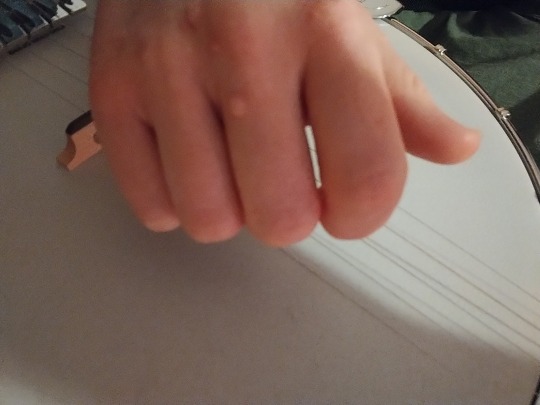
Here are the tuning pegs on a five-string banjo.
In the show, Fiddleford has a four-string banjo, not five-string. (We see two banjos; they are both four-string.) Honestly, that surprised me. I'm not sure what the folk scene looked like in the 80s, but most players you see today have five-strings, so I think they were just streamlining the design.
EDIT: I was wrong! His banjo has a disappearing and reappearing fifth nut!
A four-string banjo has four tuning pegs at the top, like any other instrument. The fifth tuning peg is about a third of the way down the neck.

BONUS:
Nobody gets into this much detail, but clever eyes will notice that the string widths look funny. If you have played a bass or guitar, you're used to the top string being lowest and thickest, the bottom string - which is the "first" string - being highest and thinnest. A four string banjo is tuned like this, but with a five-string banjo, the fifth string is the same diameter as the first.
Anyway, there are plenty of great banjo video and image tutorials on the internet if you want to get into the weeds, but I got the impression that a lot of you have literally never seen a banjo being played often enough to even realize how different it is from a guitar. Some people absolutely do strum banjos like guitars - in fact, I think that's more common with four-strings - but the McGucket music we hear is very obviously not being strummed.
There! Now you may freely choose to draw his hand however you want to, and it won't be from a place of ignorance. <3
(Oh, one last thing: that round thing that comprises the body of the banjo is literally just a drum. Drumming it is fun. You can and should draw Fiddleford tapping his banjo with the tips of his fingers like I do.)
#fiddleford#fiddleford mcgucket#fiddleford hadron mcgucket#fiddauthor#(Sorry I'm literally just trying to make sure fiddleford artists notice this.)#old man mcgucket#mcgucket#fiddleford friday#young fiddleford#gravity falls#ecruvian#my... ?#me#my writing#banjo#(Dear banjo community: I KNOW I'M NOT DOING IT RIGHT PLEASE OBSERVE MY CHEAP-ASS STARTER BANJO AND RECOGNIZE THAT I AM A NOVICE)#(Also my priority was making children's cartoon fanart slightly more accurate. Detail wasn't important.)#drawing turotial#drawing tips
40 notes
·
View notes
Text
actually tearing my hair out bc i sat down to review my fic today since i’m getting close to the publication date (i think i should mention that i write in first person for the initial draft because it goes smoother during the writing process since i’m literally just projecting what’s in my head onto the screen and then go back to change it to third person later) BUT AS I WAS GOING THROUGH THE CHAPTERS IT SOUNDED SO GOOD IN FIRST PEROSN POV :((((((((( but reading fp is kinda cringe imo so i tend to avoid it for the final draft but like AUGH IDK i’m in a dilemma I NEED HELP DECIDING
#writers come forward i need pov tips. like reader preferences and when you should use 1st or 3rd😔💔#your girl doesn’t know SHIT abt writing fics since i was cast headlong into this without a clue of how to write narrative stories#on the other note! my friend is doing very well w the drawings she’s finished abt ten characters :)#i made her do the easy ones first like dazai and akutagawa so she didn’t have to worry abt details#taught her abt subsurface scattering yesterday and she’s doing pretty good i must say. i was genuinely surprised#anywya i think it’s unfair that i help her w anatomy or wtv but she just leaves me to drown here. toxic relationship but wtv ig
50 notes
·
View notes
Text
I think my new favorite hack to find a watsonian solution (explainable within the canon of the media) to a doylist urge (this happens because I, the author, want/need this to happen) is to just. assign your doylist desires to another character.
You need your characters to be sitting next to each other in the backseat, despite the fact that it's social norm to leave the middle seat empty? Oh, the driver of the car says, the seatbelt on that side's not working, you'll have to sit in the middle seat. Why's that seatbelt just happen to be broken? Oh, it's not. The driver just wants to see these characters together as much as you do.
#kazzy writes#kazzy's guide to life#writing#writeblr#author#watsonian vs doylist#also because this is the Bad Reading Comprehension Website imma clarify in advance:#there is NOTHING wrong with 'this happens because i need this to happen'#the characters aren't real. they are devices to drive your narrative. you can make them do whatever you want.#but some writers and readers (like me) love seeing that there IS a reason these things happen that makes sense within the narrative#and sometimes that can make it difficult as an author to move forward in your writing#because it's hard to convince your brain that you can move on if you haven't figured out why every detail happens#so this is a nice tip for those who find themselves in that camp#but if you don't care: great!#i support you and you're valid and sometimes a good doylist answer is all you need!#simply move on from this post#because doylist logic is not a bug that needs to be fixed! it is sometimes necessary#and if that's how you write feel free to continue as you were :D#kazzy rambles in the tags
132 notes
·
View notes
Note
Can you please tell us what ending you planned for Taste? Always wondered if stupid Eva would have come back in the last chapters and what else you planned. It's my favorite story of yours.
I’ll give a very very bad and horrible run down of the last few chaps I had. I deeply apologize for not finishing, but I’m sure you understand. Still, im so sorry to not finish something I started.
The run down for the rest of TASTE would've been this:
Basically, if we focusing on the main couple..... (not gonna explain the smut but just know ofc it woulda been there)
WE LOVE IN SEPTEMBER:
I wanted to focus on all the miscommunication/horrible commitment issues. Most of the focus is on Lexi’s past relationship (guy basically ghosts her, moves out without comment, had commitment issues, extremely similar to Fezco in some ways except he never quite gets attached to Lexi unless she had other ppl after her; was planning on this guy and Fezco meeting in this chapter — Fezco does not know that this guy is the infamous ex).
You get a glimpse into Fezco and Lexi as an actual pairing, not just sex partners. Lot more domestic. curtains are OPEN. Fezco asks about her past relationship and gets the full picture. He sleeps over at her place most nights. He wants her to know that he’s serious about her, so they redo their entire first meeting. Retrace their footsteps under diff context. They go on an actual date, not just some meet up at the same diner I featured them in. She does meet Ash; some faye interaction. We r finally seeing a revealed business fezco voice!!!! lexi is like oh that's fine af actually.
Fezco does meet up with Eva to completely cut the tie. He feels that the only string between them is the fact that she sort of changed his life — I believe that it would’ve been like this reveal: how he got his job? She was the connect!!! And so he feels obligated to be there for her. From what I remember???). Lexi finds this out through Rue.
So, she inevitably doesn't know how to confront him. It doesn't matter tho bc Fezco tells her the moment that they meet!!!!!!
Anyway!
Rue is still plowing through relationship issues. Lexi meets up with Jules and basically sees the effects of heartbreak and gets some bad after taste of it. Jules reveals that it's not that she doesn't love Rue, it's that she doesn't know if they're ready or if they'll ever be ready. She's struggling with trusting the future. This sucks to Lexi. She trusts Fezco, but she also trusted rue and Jules relationship as it was the only stable relationship she had ever been exposed to. If not them, why would it would for her? (and nothing works out for her fr so it's like.)
Core thing is that Lexi is not really sure if she’s capable of trusting someone. All she knows is that she loves him and love is a fleeting, futile thing that doesn't have reason. Without reason, she goes to Fezco's apartment that same night, totally withdrawn and troubled, and he opens the door, doesn't ask question, pulls her into bed with him. This is where he tells her that he sort of really likes her, and she says that sort of really likes him. At first she's content with just that, but then he says something like 'I sort of really more than like you' and all of these thoughts sort of float and die away somewhere between that.
WE BLEED IN OCTOBER:
Halloween party is held to take place as planned by Fezco and Lexi (trying their absolute hardest to rekindle Jules/Rue) annnnddd Fezco does invite Lexi’s ex without realizing !!! It goes batshit crazy!!!!! Rue and Jules do not interact, Fezco's lead to believe that they're rlly done with each other (plot twist tho as Jules and Rue do reconcile and get caught being steamy in another room!!!!! who woulda thought !!!!!).
Lexi sees her ex, gets into a splat where this man is just DYING to get back w her all of a sudden since he seen Lexi and Fezco being full adults in love and shit. The guy does ask if Fezco is her boyfriend, and she hesitates. Fezco overhears this, basically gets this guy out and the energy between him and lexi just BOOM EXPLODE. They go into a separate room, have bit of an argument because he's confused as to why she didn't call him her boyfriend; she says she doesn't know why she hesitated.
Then, he says, "I love you, do you love me?"
She says yes but she admits to not knowing how to fully allow herself to. This literally KILLS him. Fezco says he's not a science experiment for her to prick and play with, and she either wants him or doesn't. They either work or they don't.
Lexi doesn't respond.
Fezco's distraught but calmly decides to take a break with their relationship at the end of this chapter. He isn't angry, he just really wishes they'd met with different intentions/desires.
WE FEAR IN NOVEMBER
you know how the chapter starts with the month? I was thinking of just being like "November." and then having blank space like BITCHHH LFAOOOOO I thought I was so slick for thinking of starting the chap all ominious with the twilight shit (Bellas depressed era!!!!).
ANYWAY. November.
Set the scene. They don’t talk. It’s hard to do that shit when you’re always 1 degree away from the person and planning a very very very small wedding ceremony that's due in 3 weeks. And the worst part? He doesn’t ignore her. He looks her in the eye, pretends as though they never tore away from each other. like !!!! He has literally no animosity for her and she's so riddled with guilt that she doesn't know how to soothe the fact that they aren't together without being selfish, saying she wants him when she, herself, is pretty broken in some way. but she loves him. she knows it but it's hard to accept that 'this' (her) is all she has to offer. She wishes he’d ignore her. He wishes she had more decency to not ignore him.
Wedding ceremony happens. Lexi IS best girl as Fezco IS best man, and they do walk down the aisle together. very much tension!!!! He tells her that she's beautiful!!!!!!! and she tells him that she misses him, to no response from him as the have to go on and walk in front of everyone. a bit gloomy but Fezco does stay looking at Lexi, and they do have a lil dance moment later in the night.
While everyone is cooling at the lil wedding after party, Lexi confesses to Rue that she always wanted something like that, what she has with Jules. And Rue basically hints that Lexi does even if it incarnated differently. Gives her some pep talk. If Jules didn't confront Rue, they wouldn't have gotten back together vice versa on if Rue didn't ask Jules out, they would've never been together. The chances of finding someone is slim and fleeting, that's why you grip onto the ones that root something into you. Fezco (of course) leaves the party.
Lexi does show up at his apartment later that night. He opens the door, doesn't know what to say but Lexi says that she's not all together, being broken and all. Fezco says that he is too, so they're of the same thing. A beat and then she says I love you and you love me. Fezco nods, says every little piece.
This terrifies Lexi and, in conjunction, terrifies Fezco. but what's worse to her is not being with him. And, thank the lucky stars, as he says some shit like “well I guess we gonna be scared together huh?” And she brightens up and says that she's never been so happy to be scared.
WE TASTE IN DECEMBER:
More of an epilogue. A calm after all that stupid shit.
Lexi decides to renew her apartment lease as does Fezco. They upgrade them friendship bracelets!!!!! Ash got himself a girl, on the phone with Fezco as he's getting ready for a lil party.
Reveal that mans has apartment key privileges!! He's letting himself in her apt and calling out her name !!!!
New years party that will be held at Jules's/rue's place (woop woop), Lexi is late as always but it’s ok bc daddy Fezco is there to joke about her needing to wear heels so she can stop running from him!!!!!!!!!!! They go, separate for a bit at the party where she DOES refer to him as her boyfriend, as he does refer to her as his girlfriend; then come back to the couch where they originally met. Lexi sits first, Fezco finds her this time!!! He jokes about whether she’s still in the streets and she says some cheesy shit like yeah, waiting for you (and we scream TOUCHDOWN!!!!). Fezco and Lexi basically simmer in their seats, smiling and kissing and finally fully engulfed, entwined to the soul.
P.S. Guilty pleasures would've morph into a connection between both characters; more interpersonal things rather than materialistic/celebratory items.
Here’s some of the writing that sits all glum! Hope this explanation gives plenty of closure.



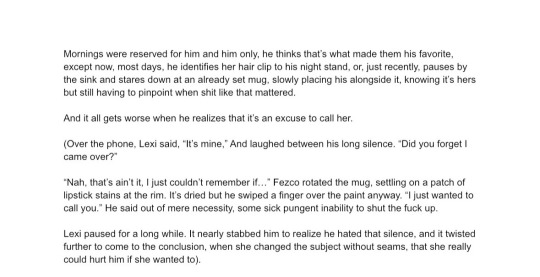
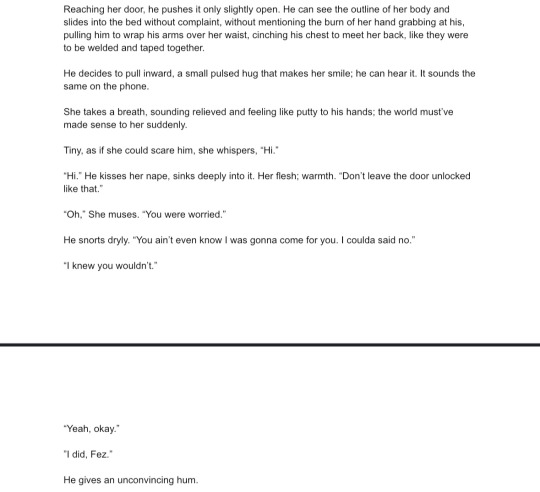
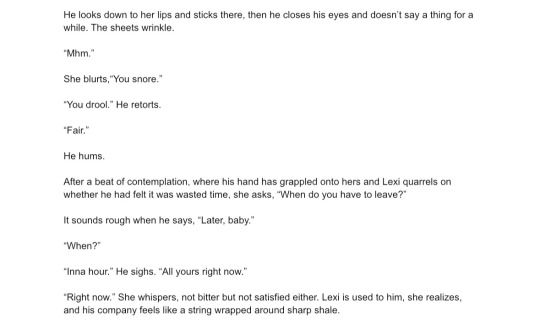
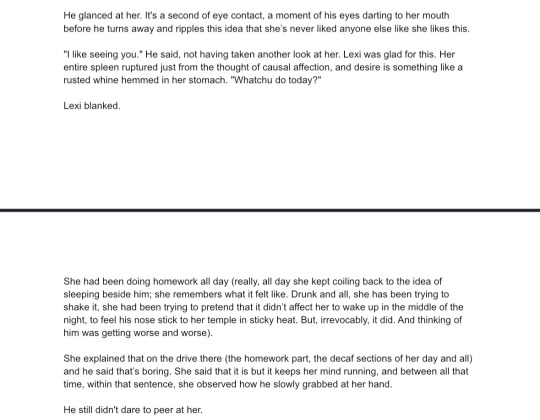

#this is a very large sort of shitty detailed post on a tumultuous sex crazed fic lol#it is nice to write a little after note about Fezco and Lexi. extremely nostalgic to me.#I’m not confident that I’ll ever come back to this fic#Sooooo that’s why this is so very long!!!! tried to give some nitty gritty.#I fear I’ll never obsess this hard#yes this fic probably would’ve tipped to 150-200k of prose and conversation yes im annoying like that!!#also I could be remembering wrong/ the details may be off but that’s just bc my actual outline was skinny Minnie and I was delusional!!
29 notes
·
View notes
Text
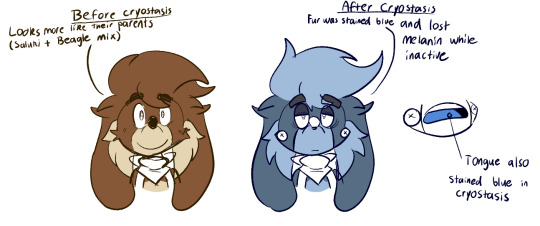
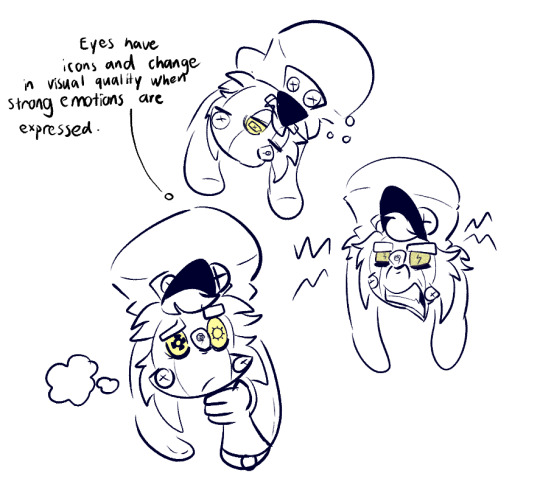
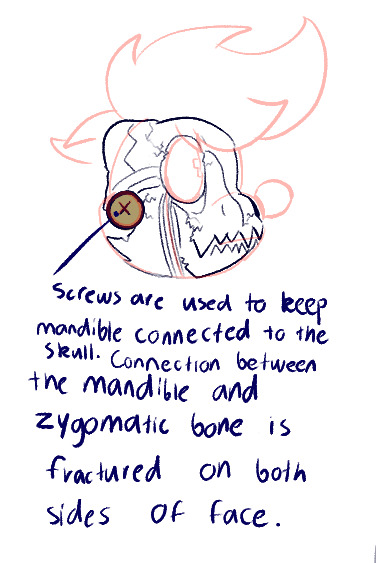
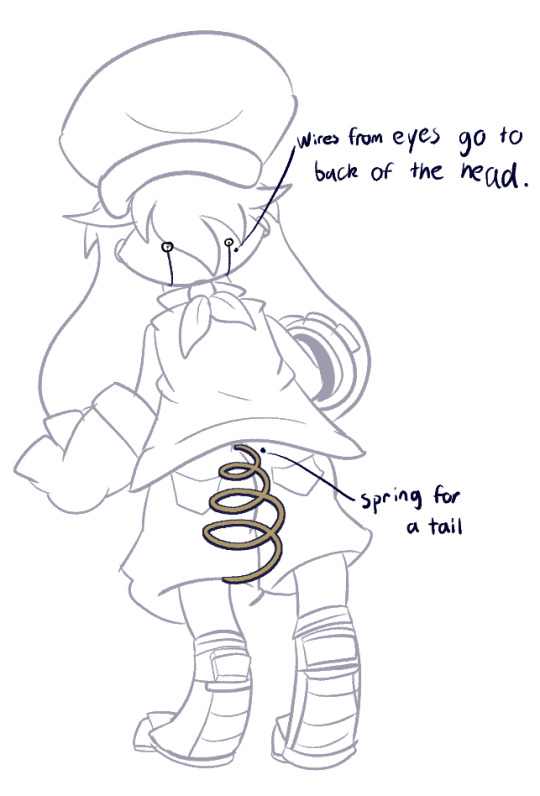
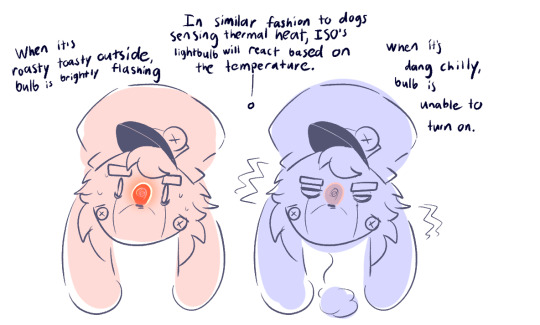
Some visual notes on the robotics of ISO! Also, an extra mess notes about them under the read more :]



#MW OC#Monkey Wrench OC#ISO#OC Art#Character Notes#OC Notes#Putting a whole nother meaning in the name ISO :)#I forgot I had these written and drawn out like a month ago! I've been thinking about notes and things about my OC's and their species#I've also got some stuff for Spark L and CJ's species jotted down but ISO has been on the braincell#Leaving out some notes because they got a wee bit spoilery and I wanna wait til I draw things out before I get to some details#But thinking about these a lot. Rotating ISO in my head like a 3d cube#This is just the tip of the ISO iceberg too. The ISOberg#HEE HEE Anyways#ISO has a near and dear place in my heart#I love all my OC's but ISO being my first MW OC gave me the push to write and develop everyone else#This dang series gave me the wake up call to make and write characters again! It's great!!#Another reminder!! Go watch Monkey Wrench!! It's so good!#And here's to the buds in the community that inspired me to keep going with these dorks. Love ya guys :)#// Long post
8 notes
·
View notes
Note
still cant get over travailshipping. i remember when you first tested the waters with it (which i believe was some time before the tpiag chapters started coming out?) and at first i thought it was pretty funny. ark slowly but surely falling headfirst for twig, who if she had a tagline it would be "if i could turn my feelings into weapons, mine would be a goddamn nuclear bomb", and her at first just being oblivious to it and thinking that the letters that expressed love and care that were written in cursive in her mailbox were just funny and she wanted to show them to ark with the guy just looking at her with the most "well that backfired in the weirdest way possible". but when tpiag finally ended i finally connected the dots as to why these two are just. augh. i wont go into detail here in your askbox but i wanna know is: HOW DID YOU DO IT. HOW DO YOU KEEP MAKING SUCH GOOD IDEAS FOR THE FUNNY DIGITAL ANIMALS. TELL ME.
(thinking to myself) "Ugh I should stop posting so much travailshipping stuff... It's probably so annoying to everyone who sees it. I feel bad for my poor followers. I'll check my inbox real quick and then commit to shaking up my content by—" *gets obliterated by your niceness*
Oh man. I remember posting that poll where I hesitantly described a possible Darkrai/Twig pairing in the tags while proposing Twig/Kip as an alternative route, despite it not being the direction I wanted to take the characters, because I was so scared of what people’s reactions might be. If I remember right, I posted it a little bit before I had just barely reached 5k words in the first draft of TPiaG.
I've been trying to write up detailed responses to how I come up with good ideas for travailshipping in particular, but there's one rule I use that defines everything after it and speaks for all of them: I have fun with the characters.
That's it. That's the rule. If I don't want to write a subject, I don't. I stick with what I find enjoyable and resonant. Does a joke make me laugh? Does a scene make me cry? Does a villain make me punch a hole in my wall? Does a cute gesture make me squeal? If so, then into the project it goes. I think people can feel when someone is having fun with their work, and that fun radiates out into their own experience consuming that work. It's like laughter— joy is something we're sharing with others as long as we feel it. Fun is contagious.
Also: when you don't force yourself to make things you hate, you attract people who like the same things as you. These people will find your work even more fun— because not only did you have fun making it, they're having double fun consuming it.
An important tangent I'll go off on is that I think that every creative project idea is a good idea. There's so many beloved bizarro ideas in the world, even the ones who try to be cool about how weird their premises are. There's this weird show where the main character works as a service industry worker in an underwater setting that's ruled by a Roman deity— he lives in a piece of fruit, and his pet gastropod makes cat noises. This show sounds like word salad garbage on paper and could be tossed out for its nonsensical nature, and yet SpongeBob SquarePants has made Nickelodeon over $13 billion dollars and is a treasured part of many childhoods. There's also a character who spends his time locked in intellectual and physical combat with a wannabe clown and wears a costume with bat ears while doing it. Batman's been an icon for over 80 years.
All of this is to say:
Ideas are always good ideas by virtue of existing. They don't derive their goodness from external sources. Beauty is in the eye of the beholder.
Make more of what you love. Don't make things you hate making.
If you have fun while making the thing, people will have fun while they consume the thing's content.
I hope this makes sense. I didn't touch on idea generation as much as embracing existing ideas. Fingers crossed that was the right response. I'd just woken up from a nap as I was writing it, so hopefully it's not too meandering and managed to answer the question and—
— Oh shoot. Was that a hypothetical question??? Uh. Sorry if I went off on this rant when you were just trying to voice your niceness. Oops. 🫥
#also: feel free to go into detail in my inbox 👀#i am always happy to hear people's thoughts on my blorbos#creativity tip#creativity advice#writing tip#writing#creativity tips#swear warning#creativity tips with sofie#(kinda)#sofie answers asks
8 notes
·
View notes
Text
Writing Tip:
One thing I do when writing is play a little game called hide the detail. This tip may already exist under a different name and maybe it could technically fall under the category of "Show, don't tell"... But this is how I was able to actually integrate "showing" into my writing.
Say you have a detail you need to include into your work but it feels a little clunky and out of place. What can you do to make that detail to feel more seamless? Using a chunk of my own writing, I will demonstrate:
The hallway between my bedroom was short enough to see the kitchen from where I lay in bed.
Not a bad start! But this feels a little too clunky for my taste. There's too much unnecessary detail considering I already provided context as to where the MC is located earlier, so we can cut some of that out. But where's the fun? Where's the pizazz? Now it's time to play hide the detail! I can do a few things:
Describe how the MC feels about the detail
Connect the detail to another person or event
Explain it using scenery
Combine it with another detail already provided
What I opted to do was hide the detail through describing how the MC feels, which adds additional context and makes the sentence read more like a train of thought rather than a statement of fact.
The short hallway provides ample opportunity to see the kitchen from my vantage point, an aspect of the small apartment I’ve cursed until this moment.
This version adds feeling, gives a better description of the apartment, and hints at the MC's personality as well.
Again, this may just be me repackaging "Show not tell" but this game is the only way I've been able to understand what they're trying to get at.
Happy Writing!!!
#i may make this a series to provide additional examples#also don't be afraid to send in your own prompts#writing tips#writing#show don't tell#writblr#hide that detail
21 notes
·
View notes
Text
New Post: Learn How to Create a Protagonist

My latest blog post is all about structuring a protagonist from scratch. It includes 6 easy steps to making a main character who feels real, plus free resources for all of your character-building needs.
Check it out here!
#character creation#writing characters#character details#character development#writeblr#writers of tumblr#writing resources#writing tips#writing advice
63 notes
·
View notes
Text
Throw Out Your Details
So you’ve been planning your project for forever, you’ve researched everything you need to research—you could practically teach a class on your topic. In fact, you’ve written so much about it, you might as well just publish your research doc as a non-fiction.
Now I’m telling you to throw out all those details.
As helpful and useful as research is (and I would always recommend going as in-depth into your research as you can) in the end you’ll maybe use like 2% of it. This is because all those facts and details aren’t… storytelling. It’s easy to get bogged down in the specifics of things, and forget the fun and the fiction.
My last project took place in a city underground, and I did countless hours of research on bunkers and underground cities and nuclear fallout. Then in my writing, I tried to explain how everything worked and why it all made sense and use all those fun details I had learned.
And it totally killed the pacing and distracted from the fun and intrigue of having a city underground. My readers were with me without explaining away the world and packing in as much evidence and proof that the things I’m saying are true and actually work. They didn’t care. They were there for the story, so story I focused instead.
As well, if things don’t work or make sense—it’s okay. Do it well enough, write a compelling story, and your readers will stick with you. Take any movie/show/book/piece of media, there’s a lot we let slide by without demanding any extra-credit reading.
Don’t let your details take away from your story. We’re here to be enchanted, enchant us. There's nothing less enchanting than a textbook.
#writing#writers#writing tips#writing advice#writing inspiration#creative writing#writing community#books#film#filmmaking#screenwriting#novel writing#research#throw out your details
370 notes
·
View notes
Text
Stage Direction in Narration
"He walked into the room." <> "She sat on the bench." <> "They left the car."
We all use stage direction. It's unavoidable; readers need to know where our characters are in the space we've created for them. And sometimes a simple statement of movement is needed. But most of the time, it can be improved upon.
🙟🙝
If it wasn't clear from the above examples, "stage direction" is when a character's movement is narrated like one might write in a play or film script: straightforward and unembellished statements indicating a character's direction.
This is great for scripts, where concise and clear instructions are preferable when a director and actor needs to follow them.
Not so great in a novel, where the author's goal is to keep a reader's interest and immersion. Let's take a look at how you might improve these sentences by adding intent, context, or grounding description.
Some of the examples below were taken from manuscripts I’ve betaread. The original authors gave me permission to use them.
Improving Stage Direction
Adding intent might be the easiest solution. You should know why your character is conducting an action; that's probably the reason you're writing the action in the first place. Instead of separating action and intent, combine them. Is your character walking towards the table to take a seat? Grab something off it? Talk to someone?
He walked towards the table. > Why? > He walked to the table and pulled out a chair to slump into.
🙟🙝
Obviously not every action has a purpose beyond itself, sometimes a character is moving in order to… well, get to where they're going. In that case, rounding it out with more context and emotionally-charged description can help create a more compelling sentence. Is there a specific way the character is conducting the action? Is there an underlying feeling within the movement that could add emotional charge?
Take the entire scene into consideration and determine your character's place in the scene and how they might be feeling. If she is one of two friends being reunited, she might move with excitement and eagerness. If he's a bystander watching the reunion, he might be more hesitant.
Paul walked up to them. > How? > Paul walked up as inconspicuously as he could so as not to disturb the reunion.
🙟🙝
Grounding means adding description to an action in order to make it tangible, to "ground" it to the world it's happening in. In the absence of purpose, this adds immersion and substance to your world, which is never a bad thing.
David sat down. > Where's the world? > David sat down and looked up at the stars glinting in the dark night sky.
Sometimes you already have the description and it's simply a matter of shuffling things around. Such as in the above example, where the original was actually:
"The stars glinted on the dark night sky and David sat down then took a deep breath. The contrast of the fresh air to the heat inside made him feel the buzzing in his body from the many glasses he had been drinking all evening."
I simply rearranged what was already there, while also combining the end of the sentence with the next to add context to him taking a deep breath: "David sat down and looked up at the stars glinting in the dark night sky. He took a deep breath and the contrast of fresh air to the heat inside […]"
🙟🙝
Other Solutions
If none of the above work, you could try eliminating or rewording.
If the surrounding sentences already imply or show the direction, you might be able to eliminate the stage direction all together.
The two of them walked out of the store. Jacob and Sam left the marketplace behind and headed north-west for Beringia. > Are both sentences needed? > Jacob and Sam left the marketplace behind and headed north-west for Beringia.
That first sentence is entirely redundant. Getting rid of it still gives every bit of information and context the reader requires. By indicating that Jacob and Sam left the marketplace, it is perfectly sensible to assume that they walked out of the store beforehand.
This often shows up in other areas of narration as well, namely, I’ve noticed, in descriptions from a character’s pov. “He looked at it” or “She stared at him” is often followed by description that perfectly indicates that the character is looking at the object.
Tarrin regarded him. The light from the torches in the gardens illuminated his dark hair and the exquisite curves of his shoulders.
By the description that follows, it is obvious that Tarrin (MC) is looking at the described character. “Tarrin regarded him” is unnecessary and taking it out only strengthens the narration.
“Is this the library?” he asked, hovering a finger over the first map. Pearl looked at it.
“Yes.” The circular nothing in the middle and the lines splayed out in every direction noting shelves and offices said it was.
Again, “Pearl looked at it” followed immediately by a description of the thing she is looking at, is redundant. If the story is from a limited perspective, a description is already telling the readers what the MC is seeing, and thus stating that it is being seen is completely unnecessary.
🙟🙝
If the sentence still definitely, absolutely, without a doubt needs to remain then a simple rewording can still be an improvement.
Instead of "She ran across the street," you could write "She sprinted across the street." Instead of "He walked up to the table," write "He ambled up to the table."
Yes, I know that's elementary writing tips 101 stuff but hey, there's a reason it's part of the bedrock of writing advice. Some words are just better than others.
Something as simple as an adverb can do the job, too: instead of "He walked towards him," write "He walked hesitantly towards him." Adding even basic emotion gives the sentence more purpose in the narration than simple stage direction.
Of course, all of this should be done during the editing process. Stage direction is actually super helpful in drafts, in my opinion, because it's an easy way to keep the narrative going while giving your future self a roadmap to follow and work with. If it moves the scene along for YOU initially and keeps you writing, that's all that matters. So don't fret about this while you're drafting.
🙟🙝
Wow, that was a lot! Are you done? Good, because this is definitely the end, I promise.
Effectively Using Stage Direction
...Okay, yes, there's more, but this is the last thing! I just feel it's necessary to lay out the exception to all this, because straightforward stage direction can actually be utilized as an effective narrative tool. Indicating a character's direction of movement can invoke emotional symbolism or build intrigue.
A character moving closer to someone or something can show emotional closeness (or desire for emotional closeness), vulnerability, security (or the desire/need for security), fondness, attraction, etc. Obviously in the opposite way, a character moving back or away can indicate emotional distance, revulsion, anger, fear, etc.
Take these two examples:
"I still love you." Her mother opened her arms. Anna stepped forward. She stopped herself, breath catching in her throat.
"But you love yourself more," she whispered.
"I still love you." Her mother opened her arms. Anna stepped back. She stopped herself, breath catching in her throat.
"But you love yourself more," she whispered.
Exact same scene, but the direction of Anna's movement completely changes the underlying emotion.
🙟🙝
In a similar sense, a character moving closer to a specific location or object can be used as a plot device: a character inching closer to a table, for example, is a miniature plot breadcrumb. It creates a small intrigue in the reader. A page later, when the character uses their proximity to the table to snatch a knife from it and defend themselves, that breadcrumb is answered and the intrigue is rewarded.
🙟🙝
In Closing
Like all writing tools, stage direction is not inherently bad. Use it strategically and it can be an effective device. Otherwise, I hope the tips here can help you strengthen your narration. As always, you are the master of your own story, and if you disagree with anything in this post, then don't implement it!
Thanks for reading~ Don’t forget to write a sentence of your story today!
#writing#editing#editing tips#writing tips#writing help#writing problems#writing advice#long post#writerblr#writing resources#writing reference#writing guide#stage direction#stage direction in narration#at what point do I give in and become a professional editor#idk guys#the BEST compliment I have ever received#was that having me as a betareader/editor was like 'writing with cheat codes on'#this is the kind of inane detailed stuff I catch and suggest how to fix
298 notes
·
View notes